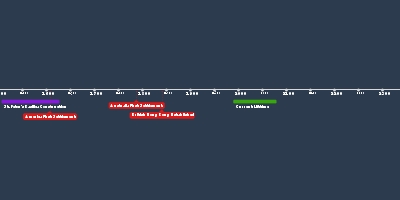First Opium War | China (sep 4, 1839 – aug 29, 1842)
Description:
The Anglo-Chinese War, also known as the Opium War or the First Opium War (Chinese: 第一次鴉片戰爭; pinyin: Dìyīcì Yāpiàn Zhànzhēng) (Cantonese: Dai Jat Ci Aa Pin Zin Zang),[citation needed] was a series of military engagements fought between Britain and the Qing dynasty between 1839 and 1842. The immediate issue was China's official seizure of opium stocks at Canton to stop the banned opium trade, and threatening the death penalty for future offenders. The British government insisted on the principles of free trade, equal diplomatic recognition among nations, and backed the merchants' demands. The British navy defeated the Chinese using technologically superior ships and weapons, and the British then imposed a treaty that granted territory to Britain and opened trade with China. Twentieth century nationalists considered 1839 the start of a Century of humiliation, and many historians considered it the beginning of modern Chinese history.[8]In the 18th century, the demand for Chinese luxury goods (particularly silk, porcelain, and tea) created a trade imbalance between China and Britain. European silver flowed into China through the Canton System, which confined incoming foreign trade to the southern port city of Canton. To counter this imbalance, the British East India Company began to grow opium in Bengal and allowed private British merchants to sell opium to Chinese smugglers for illegal sale in China. The influx of narcotics reversed the Chinese trade surplus, drained the economy of silver, and increased the numbers of opium addicts inside the country, outcomes that seriously worried Chinese officials.
In 1839, the Daoguang Emperor, rejecting proposals to legalise and tax opium, appointed Viceroy Lin Zexu to go to Canton to halt the opium trade completely.[9] Lin wrote an open letter to Queen Victoria, which she never saw, appealing to her moral responsibility to stop the opium trade.[10] Lin then resorted to using force in the western merchants' enclave. He arrived in Guangzhou at the end of January and organized a coastal defense. In March, British opium dealers were forced to hand over 2.37 million pounds of tobacco. On 3 June, Lin ordered the opium to be destroyed in public on Humen Beach to show the Government's determination to ban smoking.[11]
Added to timeline:
Date:
sep 4, 1839
aug 29, 1842
~ 2 years and 11 months
